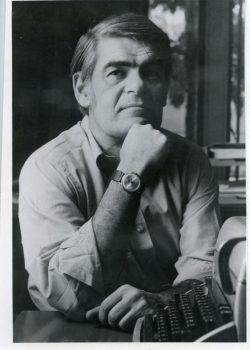Noted author, professor Jack Ludwig dies at 95
Winnipeg-born writer and academic Jack Ludwig [BA/44] died on Long Island, N.Y. on Feb. 12 at age 95. Raised in the city’s Jewish community, Ludwig was an English professor at State University of New York at Stony Brook for most of his adult life. He wrote four novels, as well as essays and reviews, but earned most praise for his short stories and sports journalism that included “Five Ring Circus: The Montreal Olympics” (1976).
Ludwig courted controversy. He was a friend of fellow writer Saul Bellow, but their relationship soured when Ludwig had an extramarital affair with Bellow’s wife, Sondra. And as an Arts student at the University of Manitoba, he was involved in what the Manitoban called “one of the biggest scandals the campus has ever seen.” On Feb. 18, 1944, Ludwig published an anti-war poem in the Manitoban, titled “Atrocities,” sparking an uproar at the university and in the community. The Winnipeg Free Press called for an investigation of the university and its structure; university officials grilled Ludwig, and the RCMP got involved. Even Time magazine reported on the incident.
Ludwig was found guilty of an “act that tarnished the good name of the university” and was expelled. He was allowed to graduate with a Bachelor of Arts, however, and proceeded to earn a PhD from the University of California, Los Angeles. Ludwig wrote regular columns for Saturday Night Magazine and co-edited “The Noble Savage”—a literary review—and “Soundings: New Canadian Poets.”








I am grateful that UM Alumni Today noted the death of my boyhood and life long friend Jack Ludwig and my fellow alumnus. The announcement is somewhat weighted with gossipy reporting and thin on his accomplishments not only as one of Canada’s finest writers but his teaching career at Harvard and the University of Toronto where he was writer-in- residence at Massey College. His novels and shorter pieces are a truly authentic portrayal of the North Winnipeg culture of our generation and as such an important historical reflection. I should also note that his “partner” in the so-called 1944 “scandal”, Bert Hamilton remained a loyal friend of Jack’s as he became a noted Professor of English at Queens University until his recent death.
I was able to speak with Jack during his final days and despite bouts of pain he maintained his wonderful sense of humour and we traded reminiscences almost always about Winnipeg. As I mourn his loss I celebrate the memory of undying friendship.
Thank you, Meyer Brownstone. I too found this article too short to deserve the title “obituary.” It fails to capture the man and the life he led. He was my graduate advisor in the Dept. of English at Stony Brook and my colleague when I was hired to teach there. He was the kind of teacher who didn’t tell you what to think but asked you what you thought. He expected much of students. When he taught Faulkner, the assignment for the semester was everything Faulkner wrote. He taught Joyce alongside Pynchon and asked us which one we thought was more “modern,” never telling us what he thought, leaving it an open question. He opened my mind in ways that influenced my appreciation of literature, my skill as a writer, and my way of teaching both. When he retired from Stony Brook, he turned over to me responsibility for running the Stony Brook $1000 Short Fiction Prize which he’d piloted from its inception. Students loved Jack. We kept in touch a bit until close to his death. In fact, I emailed him about the success of a former winner of the Short Fiction Prize, only to receive a return email from his daughter saying that he had died. For me, the world is flatter without Jack.